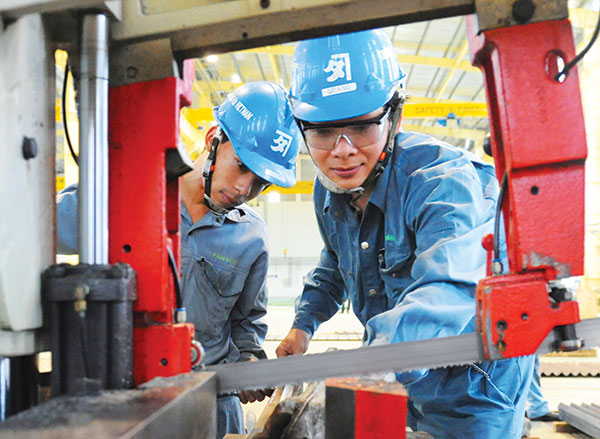Japan’s firms prefer Vietnam

Instability among its neighbours has given Vietnam an unexpected advantage in the race to attract Japanese investment
Photo: Le Toan
According to a survey on business confidence among Japanese-affiliated firms in Asia in 2013 released in Vietnam this Monday, 70 per cent of Japanese firms regarded Vietnam as an important investment base and planned to expand investment in the country.
This survey was conducted by the Japan External Trade Organisation (Jetro) with the participation of 9,371 Japanese firms in 20 countries, including 435 Japanese firms in Vietnam.
Vietnam out-polled Indonesia with 66.4 per cent, Thailand with 66.2 per cent, China with 54.2 per cent and Malaysia at 51.6 per cent.
Vietnam’s popularity increased on the 65.9 per cent surveyed in 2012, reflecting growing Japanese investment in Vietnam.
“Amid the tension between Japan and China and the political unrest in Thailand, Japanese firms are increasing their interest in Vietnam,” Atsusuke Kawada, chief representative of Jetro’s Hanoi Representative Office, said at a meeting with the Ministry of Planning and Investment last week.
Nearly 90 per cent of Japanese firms said they wanted to expand business in Vietnam because of future revenue growth, according to Jetro’s report. For non-manufacturing firms, Vietnam’s potential for growth was the key reason to expand investment.
Japan ranked at the top of foreign direct investment (FDI) for Vietnam last year with $5.7 billion in committed capital. Given the result of Jetro’s survey, Minister of Planning and Investment Bui Quang Vinh said he expected to see a sharp increase in FDI to Vietnam from Japan this year.
However, Japanese companies also faced risks when investing in Vietnam. The survey pointed out that investors faced rising wages, complicated administrative procedures, inconsistent policies, complicated tax and custom procedures and a fragmented legal framework.
One more challenge was the weakness of local supporting industries that meant higher production costs as manufacturers had to import components and spare parts from other markets.
Yasuzumi Hirotaka, chief representative of Jetro’s Ho Chi Minh City Representative Office, said Vietnam would be more attractive to Japanese firms if it could improve its supporting industry sector.
What the stars mean:
★ Poor ★ ★ Promising ★★★ Good ★★★★ Very good ★★★★★ Exceptional
Latest News
More News
- MAE names big 10 policy wins in 2025 (February 06, 2026 | 08:00)
- US firms deepen energy engagement with Vietnam (February 05, 2026 | 17:23)
- Vietnam records solid FDI performance in January (February 05, 2026 | 17:11)
- Site clearance work launched for Dung Quat refinery upgrade (February 04, 2026 | 18:06)
- Masan High-Tech Materials reports profit: a view from Nui Phao mine (February 04, 2026 | 16:13)
- Hermes joins Long Thanh cargo terminal development (February 04, 2026 | 15:59)
- SCG enhances production and distribution in Vietnam (February 04, 2026 | 08:00)
- UNIVACCO strengthens Asia expansion with Vietnam facility (February 03, 2026 | 08:00)
- Cai Mep Ha Port project wins approval with $1.95bn investment (February 02, 2026 | 16:17)
- Repositioning Vietnam in Asia’s manufacturing race (February 02, 2026 | 16:00)









![[Infographic] AMATA: Industrial and Smart City Developer](https://vir.com.vn/stores/news_dataimages/2026/022026/12/16/croped/amata-industrial-and-smart-city-developer-20260212165823.jpg?260212050401)






 Mobile Version
Mobile Version